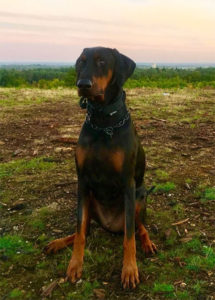Hugo is a 2 year old Dobermann who has been nominated to receive our hospital Braveheart award.
 Hugo was initially seen on the 17th September 2018 having vomited up a sock he had consumed. Hugo’s demeanour continued to deteriorate and he presented lethargic, so Veterinary Surgeon Olivia admitted him to the hospital for Intravenous Fluid Therapy and Laboratory Diagnostics. Hugo made no improvements overnight so the following day we proceeded to perform Imaging because of a suspected foreign body.
Hugo was initially seen on the 17th September 2018 having vomited up a sock he had consumed. Hugo’s demeanour continued to deteriorate and he presented lethargic, so Veterinary Surgeon Olivia admitted him to the hospital for Intravenous Fluid Therapy and Laboratory Diagnostics. Hugo made no improvements overnight so the following day we proceeded to perform Imaging because of a suspected foreign body.
Due to the gaseous distension in Hugo’s abdomen a surgical Exploratory Laparotomy was required in order to fully assess Hugo’s abdominal organs and stomach contents. During his surgery a foreign body (sock) and gas distension was identified in his Jejunum, this is the middle segment of the small intestinal tract. Hugo had to undergo an Enterectomy, where a portion of his intestines were removed in order to obtain the obstruction from his intestines.
After surgery Hugo remained hospitalised for pain management and monitoring, post intestinal surgery we like to monitor the patients faecal output to ensure everything is fully functional. Hugo was later discharged on the 19th September with continued medical management at home. Hugo had been recovering well but then began to decline just three days later. He became lethargic and anorexic at home, his abdomen was uncomfortable and he remained in a hunched posture.
Due to rapid deterioration in his condition we opted to perform more radiographs and an abdominal ultrasound which revealed free fluid. A sample of the fluid was taken and further blood diagnostics which disclosed that Hugo may have been going septic (blood poisoning) which was a life threatening concern.
Hugo was unfortunately taken back into theatre a second time to assess what was going on inside. During the surgical procedure it appeared that Hugo had severe peritonitis (inflammation of the peritoneum – a lining which forms the abdominal cavity). Adhesions were present causing his intestines to bunch and join together, this was affecting another large area of his intestines. There was also evidence of wound breakdown which can occur with any gastrointestinal surgical procedure. A further enterectomy was performed removing the most affected length of his intestines. When the intestines have adhered together, even after surgical repair there is still a potential risk of reoccurrence.
Thankfully Hugo had an uneventful recovery and continued to improve after his second surgery. He remained hospitalised until his pain levels were managed and his intravenous fluid therapy was no longer required. After doing so well we were able to transfer him onto oral medications to continue at home. Hugo was an outstanding patient throughout his hospitalisation and he was a pleasure for us to nurse him, this is why we would like to award him for his bravery. Hugo is back to enjoying life and being his normal self which we are all so glad to see.
Sadie Walters








